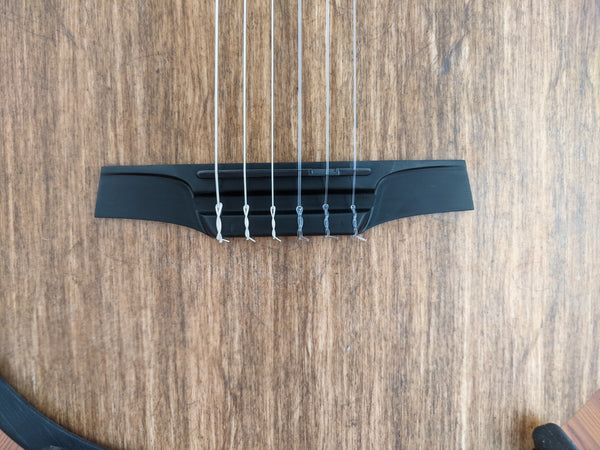Wednesday morning proved to be particularly busy at the shop. Besides setting up another Savoy, shipping out a few custom pieces, we had ecologist and professor at University of Western Australia, Richard J. Hobbs visit us for a brief interview. He is researching for his next book, titled "Trees Where Guitars Grow". The book will look at ecological impacts of the guitar industry and how luthiers around the world are responding to environmental regulations and constraints. Here recorded are highlights from his interview with our Founder Joe Luttwak.
Q: What inspired you to dive into the world of wood and guitars?
A: I am a Professor of Ecology and my area of research is in the management and restoration of ecosystems in a rapidly changing world. In other words, I am interested in trying to find ways to manage our planet better in the face of the changes caused by human activities – such as climate change (yes, it is real) and ongoing harvesting and use of natural systems. I am also a guitar nut – I love guitars and try to play as best I can. These two passions collided when I realised that guitar makers depend on raw materials that come from natural systems that are increasingly under threat. The mainstays of acoustic guitars are timbers that are becoming increasingly rare and subject to international trade restrictions – the poster child for this is the Brazilian Rosewood. So, the topic of the ecology and conservation of these woods is fascinating from an ecological perspective, and the impact of the increasing rarity on the guitar building fraternity is interesting from the perspective of industry and music. How will guitar builders respond? By sourcing ever scarcer resources? By switching to alternative woods that are more available and suistainable? Or by trying out entirely different materials to build guitars? These dual questions sum to a fascinating research project, and this is, of course, what led me to Blackbird.
Q: What are some interesting alternatives to exotic woods you have come across through your research?
A: I’m only just starting on this exploration of what guitar builders are doing. However, already it’s apparent that there is a wide range of responses out there. Some of the larger companies and many artisan builders are experimenting with many different types of wood – either alternative tropical hardwoods or locally-sourced timbers such as sycamore, oak, walnut and so on. Others are simply carrying on as if nothing is changing. For smaller operations, it may be possible to keep using the traditional woods, even if they become more expensive and have more regulations attached to their use. But for some, the changing situation is proving to be a spur for innovation and trying different things. And that, of course, includes outfits such as Blackbird, who are trying entirely new materials to build guitars that may match or even exceed the quality of guitars that use traditional materials.
Q: What are some challenges you see with guitar makers using wood alternatives?
A: There’s still a strong feeling out there that if you want a really good guitar, it has to have a spruce top and Brazilian Rosewood body. That persists even in the face of empirical evidence that alternative woods and materials probably sound just as good. So, there is a hurdle to overcome for those using wood alternatives. On the other hand, one of the factors in selling guitars is having guitars with a story. I think the Ekoa story is fascinating, and I think that as more people catch on to the idea, it will be a real winner.
Q: In light of regulations like CITEs, how do you anticipate guitar makers to respond?
A: As someone said, “Prediction is hard, especially of the future”. I think there will probably be an array of different responses, with some folks keeping on doing what they’ve always been doing, some trying out different woods, and some branching out into entirely new materials. I think that’s a great thing. It sort of reminds me of the craft beer revolution in the US – when I was first here in the 70’s there were a handful of mass-produced beers that were uniformly crap. Now there is a profusion of amazing local craft beers wherever you go. Diversity is good, and this change in availability of the traditional woods may just prove to be a spur for more innovation. As long as people keep playing guitars, there will always be a demand for new and interesting ideas.
Thanks again, Professor Hobbs, for stopping by and sharing your knowledge. We look forward to your book and the innovative ideas you come across!
Leave a comment
Comments will be approved before showing up.

